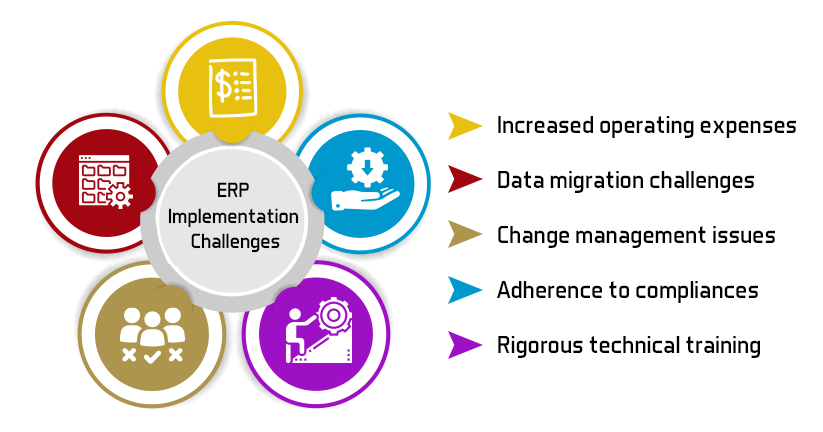Implementing an Enterprise Resource Planning (ERP) system is a significant undertaking for any organization. While ERP systems offer numerous benefits, including streamlined operations, improved data visibility, and enhanced decision-making capabilities, the implementation process can be fraught with challenges. Understanding these challenges and knowing how to address them can help ensure a smoother and more successful ERP deployment. Here’s a look at some common ERP implementation challenges and strategies to overcome them.
1. Inadequate Planning
Challenge: Many ERP implementations falter due to insufficient planning. Without a well-defined strategy, organizations can struggle with scope creep, misaligned objectives, and unforeseen obstacles.
Solution: Develop a comprehensive ERP implementation plan that includes clear goals, timelines, and resource allocation. Involve key stakeholders in the planning process to ensure that the ERP system aligns with business objectives. Conduct a thorough needs assessment to identify and prioritize the features and functionalities required.
2. Lack of User Buy-In
Challenge: Resistance from employees can derail an ERP project. Users who are not convinced of the system’s benefits or who are unfamiliar with the new processes may resist adoption.
Solution: Engage with users early in the process and involve them in the selection and design of the ERP system. Provide training and support to help them adapt to the new system. Communicate the benefits of the ERP system clearly and regularly to all stakeholders.
3. Data Migration Issues
Challenge: Migrating data from legacy systems to a new ERP system can be complex and risky. Data quality issues, compatibility problems, and incomplete migration can disrupt operations.
Solution: Conduct a thorough data audit before migration to identify and clean up any data quality issues. Develop a detailed data migration plan and perform rigorous testing to ensure data integrity. Consider using data migration tools and working with experts if needed.
4. Customization and Integration Challenges
Challenge: Customizing the ERP system to fit specific business processes or integrating it with other systems can be challenging and costly. Over-customization can lead to maintenance issues and increased costs.
Solution: Focus on selecting an ERP system that closely matches your business requirements to minimize the need for extensive customization. Prioritize essential customizations and ensure they are well-documented. For integration, use standard APIs and middleware solutions to streamline the process.
5. Budget Overruns
Challenge: ERP implementations can exceed budget due to unforeseen costs, scope changes, or underestimation of required resources.
Solution: Create a realistic budget that includes all potential costs, including software, hardware, consulting, training, and contingency funds. Regularly review and update the budget as needed, and closely monitor expenses throughout the implementation process.
6. Timeline Delays
Challenge: Delays in the ERP implementation timeline can occur due to unexpected issues, scope changes, or resource constraints, impacting the overall project schedule.
Solution: Develop a detailed project plan with milestones and deadlines. Regularly track progress and address any issues promptly. Be prepared to adjust the timeline if necessary, but avoid unnecessary delays by maintaining focus and prioritizing key tasks.
7. Change Management
Challenge: Implementing an ERP system often involves significant changes to business processes and workflows, which can be challenging for employees to adapt to.
Solution: Implement a robust change management strategy that includes communication, training, and support. Clearly articulate the reasons for the change and the benefits it will bring. Provide ongoing support and resources to help employees adapt to the new processes.
8. Post-Implementation Support
Challenge: The period immediately following the ERP implementation can be challenging as users adjust to the new system and potential issues arise.
Solution: Develop a post-implementation support plan that includes a help desk, troubleshooting resources, and ongoing training. Regularly review system performance and user feedback to address any issues and make necessary adjustments.
9. Vendor Management
Challenge: Working with ERP vendors can pose challenges, including managing expectations, ensuring service levels, and addressing any issues that arise.
Solution: Establish clear expectations and service level agreements with the ERP vendor. Maintain open lines of communication and address any issues promptly. Ensure that the vendor provides adequate support and resources throughout the implementation process.
Conclusion
ERP implementation is a complex process that comes with its share of challenges. By anticipating these challenges and proactively addressing them, organizations can improve their chances of a successful ERP deployment. Careful planning, effective change management, and strong vendor relationships are key to overcoming these challenges and realizing the full benefits of an ERP system. With the right approach, organizations can streamline their operations, enhance data visibility, and drive business growth.
